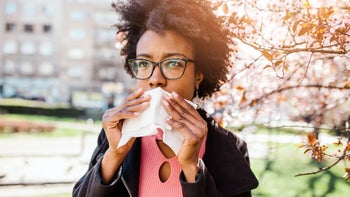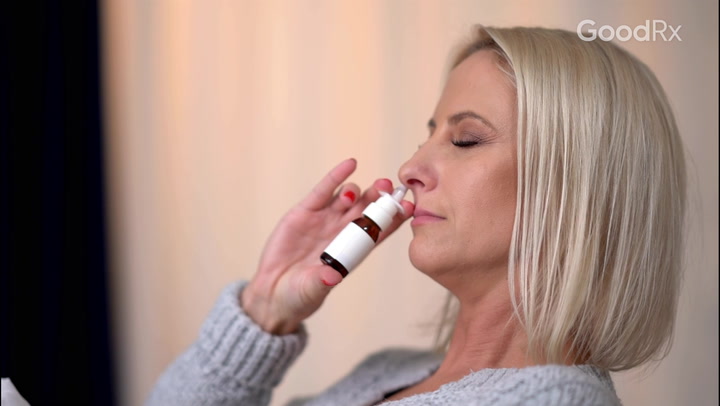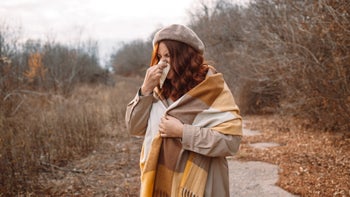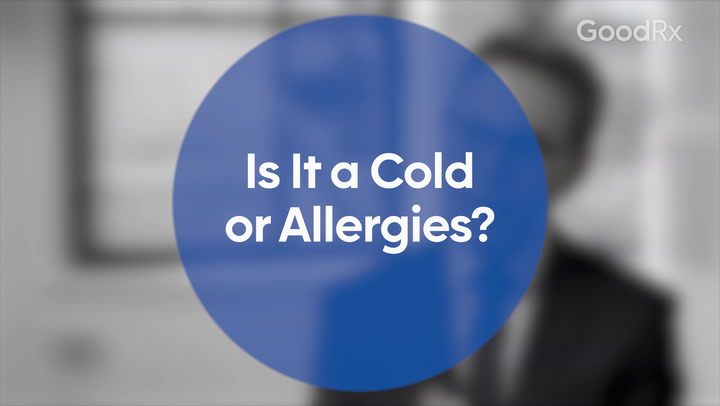
Natural Remedies for Allergies
Key takeaways:
There are many natural treatments for seasonal allergies if you want to avoid medications. These include lifestyle changes, foods, and supplements.
Remedies for natural allergy relief can be very effective, and most are low risk to try.
Natural allergy remedies may have fewer side effects than over-the-counter (OTC) allergy medications.
Access savings on related medications
Allergies occur when your body overreacts to an allergen, or trigger. These can include year-round indoor allergens (like dust mites and pet dander) as well as seasonal outdoor allergens (like pollen from trees, grasses, and weeds). And the symptoms can be very bothersome, like sneezing, itching, runny nose, and watery eyes.
There are many effective over-the-counter (OTC) allergy treatments, but these can sometimes cause side effects, like drowsiness or dry mouth. The good news is that certain natural remedies may be just as effective.
When it comes to natural allergy remedies, there are two main strategies you can try:
Avoid allergens by changing your environment and lifestyle.
Change your diet or take a supplement to lessen the symptoms when they occur.
Search and compare options
Let’s take a closer look at natural treatment options for seasonal allergies, so you can feel better fast.
Natural remedies for allergy symptoms
If you’re not able to avoid allergens completely, you might wonder: What helps with allergies? The good news is, there are many types of natural allergy relief. And there are even supplements for allergies. Let’s take a look at some of the best home remedies and natural treatments for allergies.
Hydration
One of the easiest tips to relieve allergy symptoms is to drink plenty of water. Getting dehydrated during the warmer weather in spring and summer can cause mucus to get thick and uncomfortable. Staying hydrated can help to loosen mucus and thin it out so it moves easily.
Quercetin
Some studies show that quercetin may help with allergies. Quercetin is a nutrient in many foods like berries, apples, and onions. And you can also take it as a supplement.
Quercetin is thought to be safe. But it can interact with certain medications and worsen any existing kidney problems.
Stinging nettle
Stinging nettle (Urtica dioica) is an herb that you can eat or take as a supplement. Small studies show it may help with allergies, but more research is needed. Stinging nettle is generally considered safe. But it can cause mild side effects, like nausea and vomiting.
Vitamin C
Small studies show that vitamin C may be helpful to reduce allergy symptoms. Vitamin C is in many foods, like citrus fruits and green leafy vegetables. It’s also available to take as a supplement — but doses vary. Be sure to talk to your primary care provider about the dose that is best for you.
Vitamin C is safe for most people to take. But it can interact with certain medications and may cause side effects, like flushing, headaches, and vomiting. This is especially true at higher doses.
Butterbur extract
Butterbur extract comes from the butterbur shrub. Studies show that butterbur extract may be an effective allergy treatment and works similarly to fexofenadine (Allegra) and cetirizine (Zyrtec). But there are safety concerns that butterbur may be linked to liver damage and cancer. Pregnant people should not take products containing butterbur.
Nasal irrigation and steam therapy
Nasal irrigation (like a Neti pot) or steam therapy uses salt water to rinse out the nasal passages and remove allergens. Studies show that some people who use nasal irrigation have good relief from allergic symptoms.
Nasal irrigation can be used on its own to relieve symptoms or along with other natural or medication remedies. In some cases, nasal irrigation can reduce the amount of medication needed by 30% while achieving the same symptom relief. Nasal irrigation should be done 1 to 3 times daily during allergy season for best results.
Acupuncture
Acupuncture is a traditional form of Chinese medicine that’s widely accepted for use in people with allergic rhinitis. A review of data showed that acupuncture improved quality of life and reduced symptoms in people with allergic rhinitis. Acupuncture also reduced the amount of medication needed to achieve relief. But the skill of the clinician performing the acupuncture does impact its effectiveness.
Essential oil therapy
Essential oils are medicinal oils derived from plants that are commonly used as alternative treatments. These oils have been used as a natural allergy remedy for years. Some examples are:
Lemongrass
Eucalyptus
Peppermint
Frankincense
It’s thought that they work by reducing inflammation.
One study looked at 20 different essential oils. They found lemongrass to be the most effective at treating allergic rhinitis.
How to stop allergies before they start
If you know what you’re allergic to, you can make adjustments to your home and your daily routines to avoid these triggers. For seasonal pollen allergies, you can:
Check your local pollen count, the same as you would check the weather. Avoid going outdoors on high pollen days.
Consider wearing a mask when you’re outdoors.
Close your windows to prevent pollen from getting into your home.
Try using a high-efficiency particulate air purifier (HEPA air purifier) to clean the air in your home.
If you’ve been outside and notice more allergy symptoms, try a saline rinse to wash out your nose. This can help get rid of pollen that sits in your nasal passages, which might be triggering your allergies.
If you’re also allergic to indoor triggers like pet dander or dust, cleaning your home can help with your allergy symptoms. Here are some tips you can try:
Wash your bedding in hot water and dry it on the high setting at least every 2 weeks to get rid of dust mites. You can also try dust-mite-proof pillowcases and mattress covers.
If you have carpet or area rugs in your home, try to vacuum at least every 2 weeks.
Scrub away any visible mold or mildew in your bathroom.
For pet allergies, try to keep your pet off the furniture and out of your bedroom. Keep in mind that your pet can also bring in pollen from outdoors.
What foods help relieve allergies?
There’s no particular food that has been proven to help with allergies. But many fruits, vegetables, and other foods are rich in nutrients and compounds that may be helpful for allergies, like quercetin and vitamin C.
Foods that have quercetin include:
Vegetables: Kale, onions, spinach, broccoli, asparagus
Fruits: Blueberries, cherries, cranberries, apples
Herbs: Dill, oregano, chives
Spices: Chili peppers
Beverages: Black tea and red wine
Foods that have vitamin C include:
Vegetables: Red peppers, broccoli, Brussels sprouts, cabbage, cauliflower
Fruits: Oranges, grapefruit, strawberries, kiwis
Before changing your diet, it’s important to note that grapefruit can interfere with quite a few medications. And if you take warfarin (Coumadin), a type of blood thinner, you may need to adjust your medication dose if you start eating more leafy green vegetables.
Does honey help with allergies?
You may have heard that honey helps with allergies. Bees make honey from flowers and plants that also produce pollen. So, the idea is that by eating local honey, you’re also eating a small amount of local pollen that will gradually make you less prone to seasonal allergies. This is actually the same idea behind allergy shots, a proven and effective treatment for seasonal allergies.
Unfortunately, the amount of pollen and type of pollen you get from local honey is unpredictable and can vary between batches, even from the same supplier. Though honey can certainly be a delicious addition to your diet, studies have not proven that it helps to treat allergies. It’s also important to know that you shouldn’t give honey to babies younger than 12 months.
How to stop allergies immediately naturally
The best way to stop allergies is to avoid the triggers that cause them to flare up. Once you’re exposed and starting to have symptoms, you’ll want to get your symptoms under control as fast as possible. Unfortunately, you can’t stop allergies immediately, naturally. This is best achieved with an antihistamine. But you can relieve some of the symptoms through natural means pretty quickly. For example:
Showering and washing can remove allergens like pollen and dander.
Nasal irrigation can wash away allergens and soothe irritated nasal passages.
Saline eye drops can also wash away allergens and soothe irritated eyes.
Honey can coat and soothe a sore throat caused by allergens.
The quicker you start using home remedies or natural treatments for allergies, the more effective they are. If the symptoms get severe, it will take longer for any medication to work.
The bottom line
Allergies can be bothersome. But there are some natural allergy remedies that can provide relief. The easiest and safest way to help allergies is to avoid any known triggers. Adding more healthy fruits and vegetables into your diet may help, too. Supplements, like quercetin and vitamin C, are also an option. But it’s important to be aware of their potential medication interactions and risks.
If you’re curious about a safe natural allergy treatment for you, talk to a healthcare professional before trying them.
Why trust our experts?


References
American Family Physician. (2023). Allergies: Controlling your symptoms.
Andres, S., et al. (2018). Safety aspects of the use of Quercetin as a dietary supplement. Molecular Nutrition and Food Research.
Bakhshaee, M., et al. (2017). Efficacy of supportive therapy of allergic rhinitis by stinging nettle (Urtica dioica) root extract: A randomized, double-blind, placebo- controlled, clinical trial. Iranian Journal of Pharmaceutical Research.
Bergmann, K. C., et al. (2021). Nonpharmacological measures to prevent allergic symptoms in pollen allergy: A critical review. Allergologie Select.
Centers for Disease Control and Prevention. (2023). Foods and drinks to avoid or limit.
Dabeek, W. M., et al. (2019). Dietary quercetin and kaempferol: Bioavailability and potential cardiovascular-related bioactivity in humans. Nutrients.
European Medicines Agency. (2010). Assessment report on Urtica dioica L., Urtica urens L., folium.
Hermelingmeier, K., et al. (2012). Nasal irrigation as an adjunctive treatment in allergic rhinitis: A systematic review and meta-analysis. American Journal of Rhinology and Allergy.
Jafarinia, M., et al. (2020). Quercetin with the potential effect on allergic diseases. Allergy, Asthma, and Clinical Immunology.
Mitoshi, M., et al. (2014). Suppression of allergic and inflammatory responses by essential oils derived from herbal plants and citrus fruits. International Journal of Molecular Medicine.
Munjal, M., et al. (2020). Study of vitamin C therapy in allergic rhinitis. International Journal of Otorhinolaryngology and Head and Neck Surgery.
National Center for Complementary and Integrative Health. (2020). Butterbur.
Rajan, T. V., et al. (2002). Effect of ingestion of honey on symptoms of rhinoconjunctivitis. Annals of Asthma, Allergy, and Immunology.
Schapowal, A. (2002). Randomised controlled trial of butterbur and cetirizine for treating seasonal allergic rhinitis. British Medical Journal.
Schapowal, A. (2005). Treating intermittent allergic rhinitis: a prospective, randomized, placebo and antihistamine-controlled study of Butterbur extract Ze 339. Phytotherapy Research.
Seidman, M. D., et al. (2015). Clinical practice guideline: Allergic rhinitis. Otolaryngology–Head and Neck Surgery.
Taw, M. B., et al. (2015). Acupuncture and allergic rhinitis. Current Opinion in Otolaryngology and Head and Neck Surgery.

























